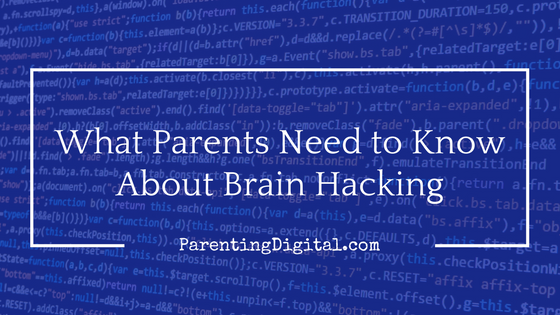It would appear that the apps we and our kids have on our devices may actually be hacking our brains.
In “Brain Hacking,” a recent episode of 60 Minutes, correspondent Anderson Cooper interviews tech insiders who bluntly admit that apps are often designed to create an addiction-like behavior.

What is brain hacking?
Cooper speaks with Tristan Harris, a former Google product manager.
“Inadvertently, whether they want to or not, they are shaping the thoughts and feelings and actions of people,” said Harris. “They are programming people. There’s always this narrative that technology’s neutral. And it’s up to us to choose how we use it. This is just not true.”
Harris also expresses concern over the impact of such programming efforts. He warns that the constant distractions of apps and emails are “weakening our relationships to each other, and destroying our kids’ ability to focus.”
Also interviewed in the episode are researchers like Larry Rosen at California State University Dominguez Hills. Their research suggests that “our phones are keeping us in a continual state of anxiety in which the only antidote – is the phone.”
Referring to cortisol, the fight-or-flight hormone, Cooper wryly observes, “So the same hormone that made primitive man anxious and hyperaware of his surroundings to keep him from being eaten by lions is today compelling Rosen’s students and all of us to continually peek at our phones to relieve our anxiety.”
Other takeaways from the report:
- To build in an addictive quality to their products, designers and programmers include features to increase “engagement” and create a stronger need for the user to interact. One example that Harris gives is Snapchat’s use of “snapstreaks,” which require users to send snaps within 24 hours of the last one. This pressure can cause teens to stress about going on vacation, for example, prompting them to give their password to friends to keep the streak going.
- There are companies solely devoted to the neuroscience of “brain hacking” in programming. Dopamine Labs is one such startup that is constantly experimenting to see when to increase social media engagement and notifications for highest interaction from users. For example, sometimes apps withhold notifications until a more effective time when they can send a burst. This creates more of a hit of dopamine, the feel-good hormone that gets triggered when we’ve been rewarded.
- There is a reason Facebook (and others) use a continual scroll: it is much more addictive.
The idea of technology being legitimately addictive is still being studied and debated, but there is no doubt that it affects us in addictive ways.
A 2016 Common Sense Media report, Technology Addiction: Concern, Controversy, and Finding Balance, defined this behavior using a different term, but with very similar characteristics:
Problematic media use is a term that describes dysfunctional ways of engaging with media and encompasses many related terms, including Internet addiction, technology addiction, Internet gaming disorder, and others. Media users’ problematic relationships with media and devices, such as smartphones, could be characterized as compulsive, obsessive, or unhealthy.
What can parents do to prevent brain hacking?
So, now we know what most of us already suspected (just examining our own tech use.) What can we as parents do about this?
Of course, we could petition and boycott and write our representatives. But let’s be honest: there is a lot of money to be made in app development. Even Apple turned down Dopamine Lab’s Ramsay Brown when he tried to sell a habit-breaking app on the Apple Store. (Apple didn’t want “any app that would encourage people to use other apps or their iPhone less.”)
Instead, let’s just teach our kids differently about that device in their hand. Here are some suggestions:
- Create tech-free zones in the house and through the day.
- Talk to our kids openly about what tech may be doing to us. Avoid preaching; instead, just explore together how it changes us and how it might affect relationships in positive and negative ways.
- For younger children, especially, create opportunities for the reward center of their brain (dopamine) to be triggered by things other than screens.
- Encourage, challenge, and mentor our tweens and teens how to turn off notifications and features that encourage constant checking of our devices. Be sure to explain why.
- Set clear expectations and limits for app and device usage. This goes for us, too!
- Explore and use apps that can, ironically, help to limit tech. There are a number of filters, of course. But also try apps like Freedom or Moment (for iPhone), AppDetox or StayOnTask (for Android), and OffTime or BreakFree (iOS and Android).
How have you and your family reduced your “addiction” to your smartphones and devices? Help us out with your ideas by adding to the comments below!

Go to our website — https://glavgeocom.ru/html/pgs/index.php?promokod_755.html
Explore the latest here > https://etwcloudtv.com/ueditor/pages/le_meilleur_code_promo_2.html